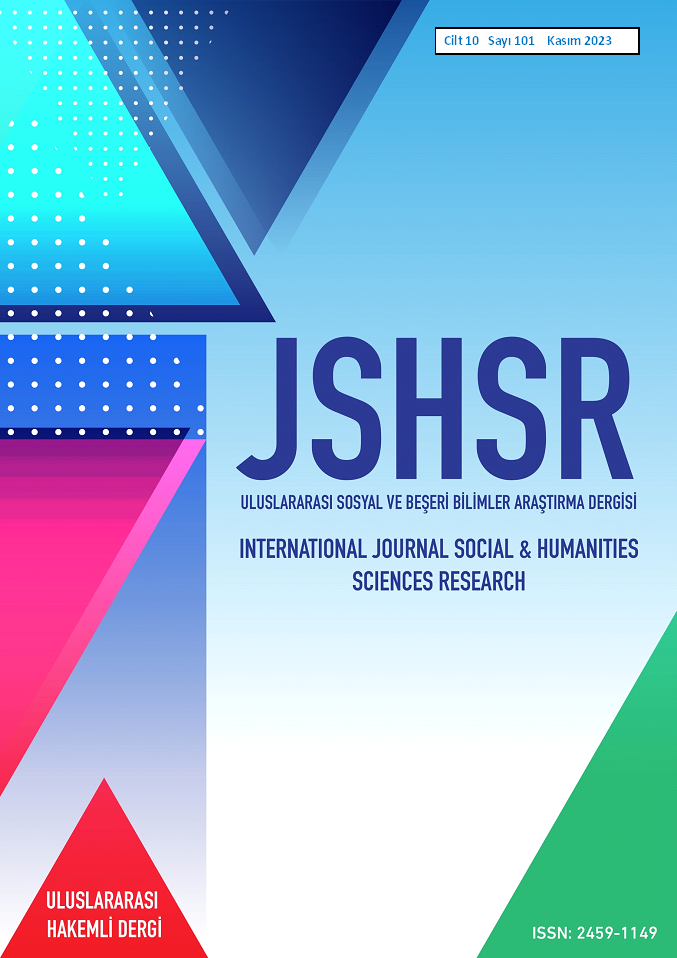Teachers' Views on the Education of Syrian Students
DOI:
https://doi.org/10.5281/zenodo.10255734Keywords:
Migration, Refugee, Student, TeacherAbstract
The study examined the personal opinions of first class (first class) teachers who continue to serve in two separate and independent primary schools in Pamukkale district, one of the central districts of Denizli, as well as the opinions relating to education about students residing in our country as foreign nationals. There has been a lot of migration to our country, mainly to the countries of the Middle East, over time ranging from our nearest geography. But none of these migrations have affected our country as deeply as the Syrian migrations. It is quite natural for these refugees, who migrate from Syria to our homeland, whether they wish or not, to face a number of challenges in the new environment in which they come, and in our country of different cultural values. In this new environment that has been acquired, the problems of adults and the difficulties of school-age children have come up with. And the point we're dealing with in this study is children of educational age. The difficulties of these refugee children in the educational age in learning both to adapt to the environment and to the values of our country are one of the reasons why we are inclined to this issue, and the most important one. We'll be happy if we can make a small contribution to these young hearts of tomorrow in our work. We interviewed 30 teachers in these educational institutions to study the educational challenges faced by refugees residing in our country in order to serve this purpose that belongs to us. In these discussions, we clearly conveyed the purpose of our work to the teachers. According to the results of this study, it is believed that in order to eliminate cross-cultural diversity among foreign-educated students, the primary goal is to solve the problem of high school, as well as to provide a more flexible curriculum and psychological support.
References
Arabacı, İ.B., Başar, M., Akan, D.,Göksoy, S. (2014). An analysis about educational problems in camps in which Syrian refugees stay: condition analysis. International Journal of Social Sciences & Education 4 (3) , 668-681.
Ayyıldız, M. (2011). Suriye Ölçeğinde Türk Dili ve Edebiyatı Öğretimi: Üç Ana Dil, Üç Farklı Etnik Yapı ve Üç Ayrı Kültürel Donanım Ortamında Türkçe Öğretimi. AİBÜ, Eğitim Fakültesi Dergisi 11(1), 11-18.
Bulgan, M . (2007). Uyum Sürecinde Almanya’nın Kuzey Ren Vestfalya Nrw Eyaletinde Türk Çocuklarının Eğitimdeki Konumu ve Türk Müziğinin Liselerdeki Yeri. İnönü Üniversitesi Eğitim Fakültesi Dergisi, 8(13) 131-144 .
Büyüköztürk, Ş., Çokluk, Ö. ve Şekercioğlu, G. (2012). Sosyal bilimler için çok değişkenli istatistik: SPSS ve LISREL uygulamaları.Pegem Akademi.
Coşkun, İ. ve Emin, M. N. (2016), Türkiye’deki Suriyelilerin Eğitimde Yol Haritası: Fırsatlar ve Zorluklar, SETA Yayınları. https://file.setav.org/Files/Pdf/20160906135243_turkiyedeki-suriyelilerin-egitiminde-yol-haritasi-pdf.pdf
Creswell, J. W., Hanson, W. E., Clark Plano, V. L., & Morales, A. (2007). Qualitative research designs: Selection and implementation. The counseling psychologist, 35(2), 236-264.
Creswell, J. W. (2013). Araştırma Deseni. (Çev. Demir, S.B.). Ankara: Eğiten Kitap.
Er, A. R., ve Bayındır, N. (2015), İlkokula Giden Mülteci Çocuklara Yönelik Sınıf Öğretmenlerinin Pedagojik Yaklaşımları. Uluslararası Sosyal ve Eğitim Bilimleri Dergisi2(4), 175-185.
Erden, G. ve Gürdil, G. (2009) Savaş Yaşantılarının Ardından Çocuk ve Ergenlerde Gözlenen Travma Tepkileri ve Psiko-Sosyal Yardım Önerileri. Türk Psikoloji Yazıları, 12(24), 1-13.
Feuerherm, E. (2013). Language Policies, Identities, and Education in Refugee Resettlement [Yayımlanmamış Doktora Tezi]. University of California.
Girgin, G. (2010). Bir Grup İlköğretim Öğretmeninde Tükenmişlik Sendromu. Türkiye Klinikleri Tıp Bilimleri Dergisi, 31(3), 602-608.
Guest, G., Namey, E. E., & Mitchell, M. L. (2012). Collecting qualitative data: A field manual for applied research. Sage publications. https:// doi. org/10.4135/9781506374680
Göç İdaresi Genel Müdürlüğü, (2023, Ekim 19). Türkiye’deki Suriyeli Sayısı Ekim 2023 https://multeciler.org.tr/turkiyedeki-suriyeli-sayisi/
Kardeş, S. & Akman, B. (2018). Suriyeli Mültecilerin Eğitimine Yönelik Öğretmen Görüşleri. İlköğretim Online, 17 (3) , 0-0. DOI: 10.17051/ilkonline.2018.466333
Kosheleva, E. Y., Samofalova, E. I., Holtman, C., and Kopotilova, Y. E. (2015). Chinese Students in Russia: Causes of Migration and Basic Educational Behavioral Tenets. Procedia Social and Behavioral Sciences, 215, 38-42.
Kohler, A. D., ve Lazarin, M (2007). Hisponic Education in the United States. Washington D.C.: National council of La Raza.
Manço, A. (2000). Belçika'da Türklerin 40 Yılı (1960-2000): Sorunlar, Gelişmeler, Değişmeler. Muğla Üniversitesi Sosyal Bilimler Enstitüsü Dergisi , (1) , 119-133.
Matthews, H. & Ewen, D. (2006). Reaching all children: Understanding early care and education participation among immigrant families. Washington, D.C.: Center for Law and Social Policy.
Mercan Uzun, E. ve Bütün, E. (2016). Okul öncesi eğitim kurumlarındaki Suriyeli sığınmacı çocukların karşılaştıkları sorunlar hakkında öğretmen görüşleri. Uluslararası Erken Çocukluk Eğitimi Çalışmaları Dergisi, 1(1), 72-83.
Merriam, S. B., & Tisdell, E. J. (2015). Qualitative research: A guide to design and implementation. JohnWiley & Sons.
Milli Eğitim Bakanlığı (2015). T.C. Millî Eğitim Bakanlığı 2015-2019 Stratejik Planı. https://sgb.meb.gov.tr/meb_iys_dosyalar/2015_09/10052958_10.09.2015sp17.15imzasz.pdf
Nykiel-Herbert, B. (2010). Iraqı Refugee Students: From A Collection Of Aliens To A Community Of Learners. Multicultural Education, 17(3), 2-14.
Pumariega, A. J., Rothe, E., & Pumariega, J. B. (2005). Mental health of immigrants and refug ees. Community mental health journal, 41(5), 581-597.
Seydi, A. R. (2013). Türkiye’deki Suriyeli Akademisyen ve Eğitimcilerin Görüşlerine Göre Suriye’deki Çatışmaların Suriyelilerin Eğitim Sürecine Yansımaları. Süleyman Demirel Üniversitesi Fen-Edebiyat Fakültesi Sosyal Bilimler Dergisi, 2013 (30) , 217-241.
Topsakal, C., Merey, Z., ve Keçe, M. (2013). A Qualıtatıve Study On Educatıon Rıghts And Problems Of Immıgrant Famılıes’ Chıldren. Uluslararası SosyalAraştırmalar Dergisi, 6(27), 546-560
Downloads
Published
How to Cite
Issue
Section
License
Copyright (c) 2023 INTERNATIONAL JOURNAL OF SOCIAL HUMANITIES SCIENCES RESEARCH

This work is licensed under a Creative Commons Attribution 4.0 International License.


